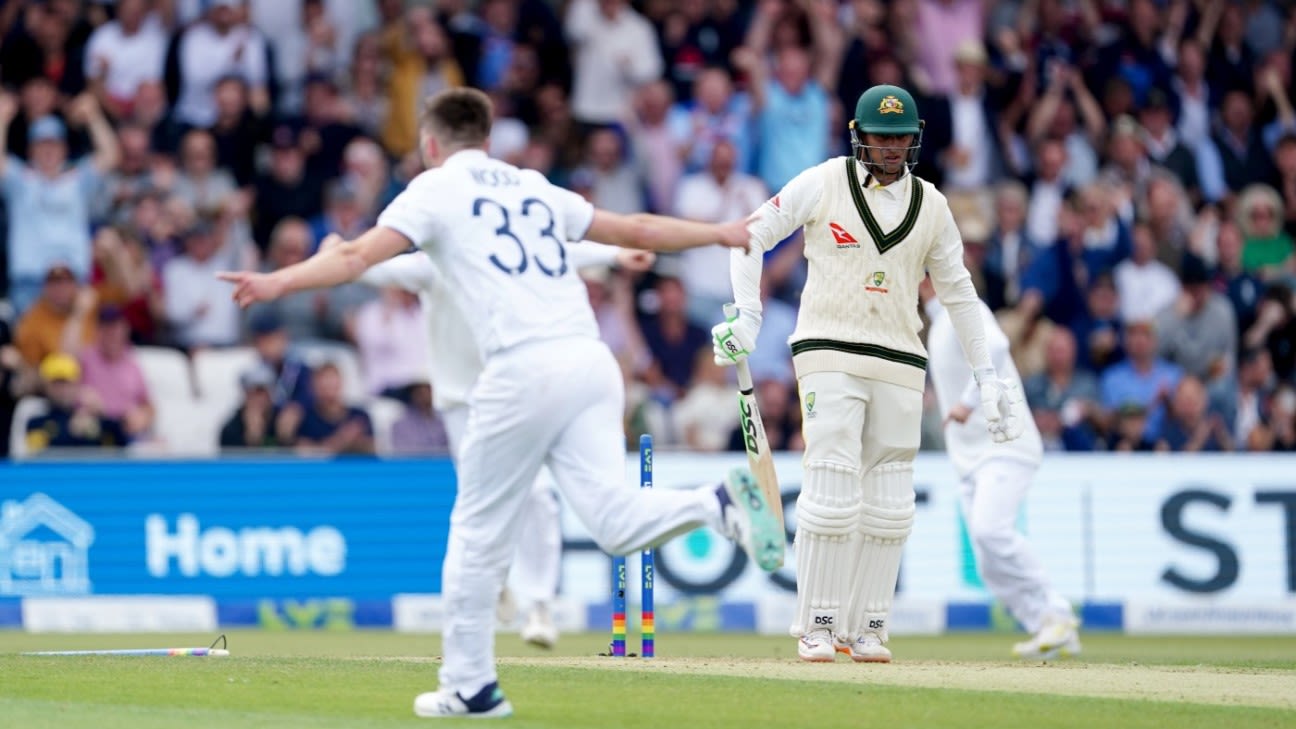
He caused Labuschagne and Smith uncomfortable moments, removing them a combined five times in the four matches he played. Both were again rushed by Wood's pace at Headingley and this time his efforts at hurrying up Australia's top order and cutting through the tail in the first innings ended with victory. He also brought wickets at the other end; it was no coincidence that he was bowling when Moeen Ali claimed his double.
"You can plan for things but when you get out there you've got to be able to adapt and adjust. And maybe we didn't do that in the first innings of the game.
"Going forward, we're going to be challenged with that. He's a good bowler, he gives them variety in their attack and I think if we can put a few overs into him we saw that the ball speed can drop off a little bit.
"But when he's got his tail up he's going to be a handful, so I think deny him any opportunities to make inroads and keep him out there a bit longer."
When Wood knocked over Australia's tail in the first innings it was largely with the fuller delivery, crashing into the stumps of Mitchell Starc and Todd Murphy while pinning Pat Cummins lbw. In contrast, Australia bowled shorter at England's lower order when they helped add 95 in 10 overs after lunch on the second day, and used a similar approach in the chase.
By way of comparison, Australia bowled 52 deliveries classed as short or short of a length to England's Nos. 8-11 in the Test, which brought three wickets but cost 65 runs. England bowled 40 balls classed as good length or full at Australia's tail, taking four wickets and only costing 21 runs.
McDonald believed that conditions played a big part in what tactics worked well, but added Australia would assess how they went about it.
"The short ball's been used more regularly in this series than I've ever seen before," McDonald said. "And with the short ball comes the risk of runs, and that sometimes happens - shorter boundaries, faster outfield and the short ball probably didn't reap the same rewards with the lower order as it has.
"But I still think it's going to be a plan that's employed throughout the series. I think if it works you say that it works, and if it doesn't then you're probably on the opposite side.
"Day one Mark Wood had ball speed and the ball was shifting, the overheads were pretty thick and you tend to pitch the ball up a lot more in those conditions. When the sun comes out and the ball's not shifting as much, you've probably got less options on the fuller side so we've got to always balance that. We critique ourselves pretty harshly so we'll be looking into that no doubt."
"[There are] some areas where we can no doubt improve and a little bit of credit goes to England," he said. "At certain times they got the conditions in their favour and they maximised those, and I thought [Saturday] went a long way to deciding the fortunes of today.
"In difficult batting conditions, they maximised them with the ball and put us probably in a position where we didn't have enough runs to be as creative as we would have liked."
Andrew McGlashan is a deputy editor at ESPNcricinfo















 Phone: (800) 737. 6040
Phone: (800) 737. 6040 Fax: (800) 825 5558
Fax: (800) 825 5558 Website:
Website:  Email:
Email: 






